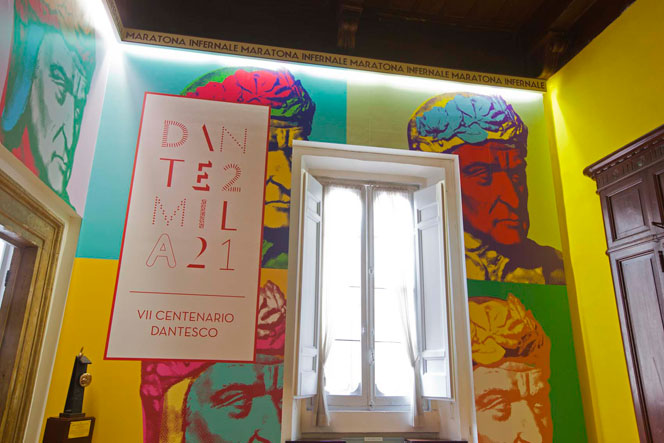Italy is everywhere. It is in Tunisia, Thailand, China, India, the Americas, Cyprus, Zimbabwe... an endless list of countries that Italy has reached also thanks to Societa Dante Alighieri. Since its foundation – in 1889, by a group of intellectuals led by Giosue Carducci – the institute has constantly contributed to spreading Italian language and culture in the world; it now boast 423 Committees scattered in sixty countries, nearly six thousand Italian language courses attended by two hundred thousand students, three hundred libraries, with half a million volumes available to anyone who has a passion for the country of Michelangelo and Columbus. In Italy, 95 Committees organize over 130 Italian language courses attended by about six thousand students every year; there are 266 Plida centers (Plida is the acronym of 'Progetto Lingua Italiana Dante Alighieri', "Dante Alighieri Italian Language Project"), which issue certificates of Italian as a foreign language recognized by the Italian Ministry of Labor and Social Policy and Ministry of Education, University and Research...
Societa Dante Alighieri – which employees affectionately shorten to "the Dante" – has its headquarters in the heart of Rome, in Palazzo Firenze, a magnificent building from the late 15th century, decorated by Prospero Fontana and Jacopo Zucchi.
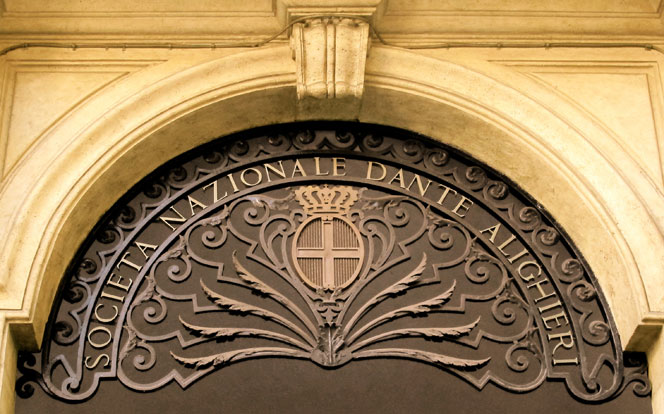
In this gorgeous setting, we met Alessandro Masi, the Dante's general secretary. In typical Italian fashion, he offered us coffee as soon as we arrived. We could not help but notice that the cups were decorated with the Dante logo, and made by a company in Rosario, Argentina. Masi explained that they are part of a set that an industrial ceramics manufacturer donated to them. Thus, with the image of an Argentinean businessman with a passion for Italian culture, the relationship between culture and business marked our conversation from the start.
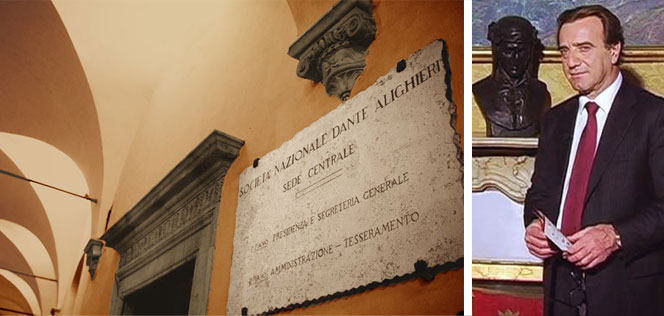
Alessandro Masi, General Secretary of Societa Dante Alighieri
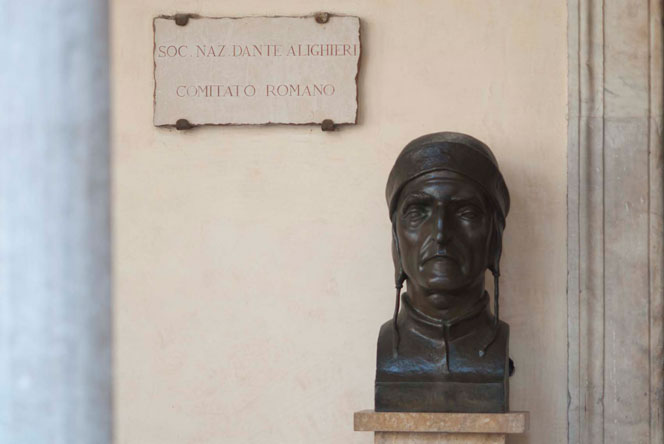
What can you tell us about the interest the world has for Italian history and culture, from the Dante's standpoint?
Please let me point out an important fact first. Usually, people think that the widespread interest for Italy is only related to the country's great artistic heritage. In fact – and this is the first time I have the chance to say it in an interview – the data we gathered by conducting research among our students in the world paints a much more complex picture. Italy is perceived as a composite cultural system, whose attractiveness is due to culture and art as well as to the scientific and technological research it fosters. We must not forget that Italy is one of the eight most important economic powers in the world, and that it is involved in some of the greatest international projects in the fields of aerospace research, nanotechnology, as well as in the implementation of new medical technologies. Few people realize that many of our students decide to further their education in Italy to go on to further scientific specializations. Of course, we celebrate the fact that the "hard core" of people struck by our country's artistic charm and culture is still strong and intact. This contributes to making Italian the fourth or fifth language in the world that is most often studied out of cultural interest, not need. However, we must remind ourselves that many foreigners consider our technological and industrial system a source of unique knowledge. Sometimes I wonder if we Italians are aware of this potential of ours: outsiders seem to hold our points of excellence and breakthroughs in innovation in higher consideration than we do...
What do you think is the cause of this lack of awareness?
First and foremost, I blame the lack of connection between the Italian cultural system and industry: rather than stay in separate territories, the two should find areas in which they can collaborate. A large number of foreign companies consider us essential partners for their innovation endeavors. For instance, after the 2009 earthquake in Abruzzo, the Swiss watchmaker Swatch offered the University in L'Aquila eight million euros to build a research center for scientific and technological innovation. Unfortunately, the generous offer was not followed up on...
This kind of incident, however, only confirms that Italy – considered the homeland of the Renaissance and of its incomparable beauty – is also deeply valued for its excellence in innovation. Of course, there is a strong background leading to this. Italy's intellectual tradition drives its roots in an illustrious past: Leonardo believed that art is beauty as well as knowledge; today, Rubbia, Hack, Levi Montalcini, and many other scientists well represent the country globally. We must not stop at stereotypes. Michelangelo was Italian, but so are fifty of the researchers at Geneva's CERN. This is something that once was very clear to many Italian businessmen.
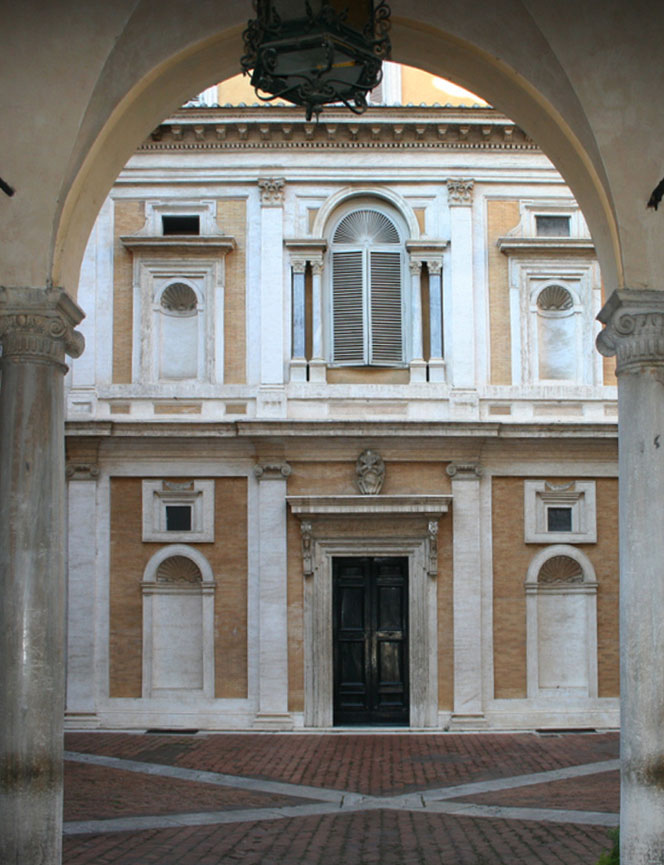
Palazzo Firenze, view of the courtyard
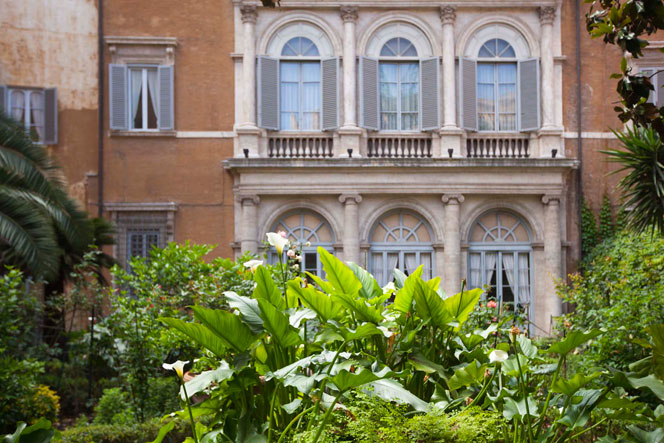
Bartolomeo Ammannati, the facade of Palazzo Firenze facing the garden
What do you mean?
I'm thinking of what Olivetti or Falck did, just to mention a couple. They understood the great value that culture adds to industry. Olivetti was fully aware that employees should not be exploited to the limit, but considered as intellectual resources that must be equipped with the tools they need to grow. The Dante has carried out a few small-scale but noteworthy activities in this direction, for example granting scholarships to Mexican students from Guadalajara who wanted to study the Piedmontese manufacturing industry. The world is hungry for our kind of expertise. To give another example, Vietnam – a quickly expanding economy, at the rate of 6% GDP growth per year – is also a country where Italian clothes and technology, and the Piaggio brand in particular, are held in great consideration. All of this potential should be enhanced, by creating a system in which culture and industry can cooperate. The Dante tries to contribute to this goal.
Can you give us some examples of how?
We regularly raise awareness among institutions in two different ways. One is constantly liaising with the Italian Ministry of Foreign Affairs and the Directorate General for the Country Promotion. The other is always giving Parliament commissions information about our activity. The Dante – probably better known abroad than here in Italy – has 423 foreign Committees that can feel the planet's pulse in real time, thus allowing us to make informed suggestions and give answers. We recently asked ENI to support us in locations with a strong commercial and industrial potential, but unfortunately the multinational oil and gas company has not shown interest. This is becoming a general negative trend with a real impact on our budget, also considering that public funding has decreased by 84%. This is why I keep advocating for the world of manufacturing to rediscover the essential reasons, and most importantly the right connections, to establish a new balance between culture and productivity in Italy. Furthermore, all of us, as citizens, should get involved in the resurgence of the Dante, as one of the best virtual places where we can rebuild the identity of our civilization.
Has the drastic cut in public funding taken a serious toll?
Yes, very serious. Just to give one example, we have not been able to provide scholarships for students who wanted to come to Italy to study. Scholarships were one of our ways to allow people from around the world to get to know our country, creating "ambassadors of Italian culture" and generating obvious benefits.
However, the Dante still has a strong presence worldwide...
Luckily, yes. We have recently opened a new office in Baku, the multicultural capital of Azerbaijan and a great example of how Islam, Orthodox Christianity and other minorities can coexist in peace. Unfortunately, however, we have to limit our activities to the bare minimum because of our financial constraints, while France and Germany make lavish investments to promote their languages, which with good reason they consider a fundamental tool for cultural penetration. As Francesco Bruni said, Italian is a "language without weapons", meaning it did not expand in the world through colonialism like Spanish, French and English. Italian has "traveled" on its own two legs, by proving it can create and propagate wealth. I think we should really stress how enjoyable studying Italian and the Italian culture is for foreigners. The Italian language is like a flower garden everyone wishes they had, it brings happiness to the soul, as the highest of cultural pleasures.
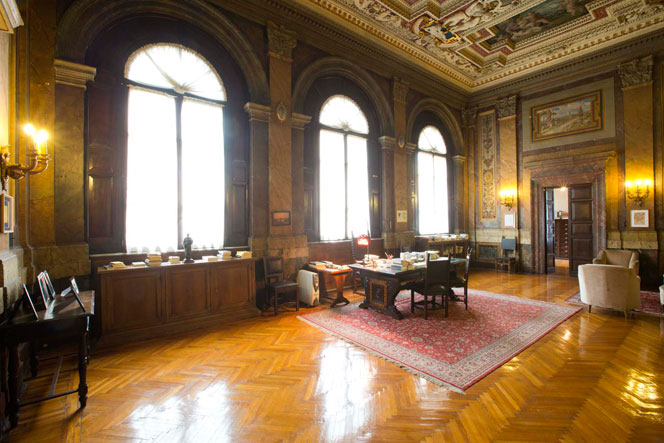
Palazzo Firenze, first floor gallery
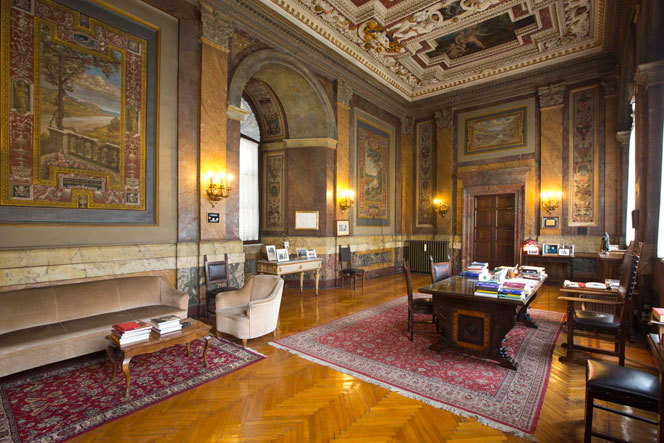
Palazzo Firenze, first floor gallery

Palazzo Firenze, statue of Dante in the gallery on the first floor
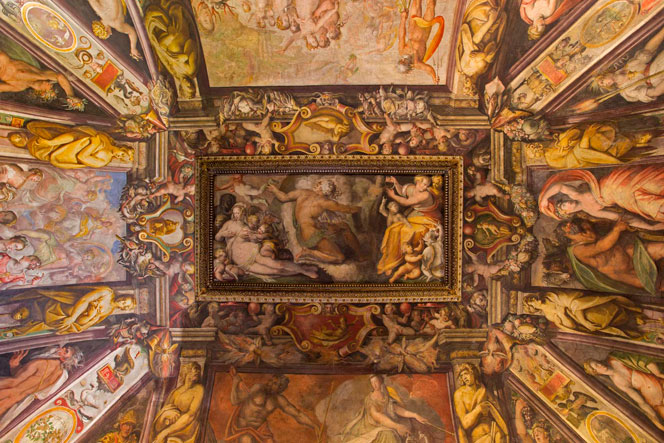
Palazzo Firenze, frescoes by Jacopo Zucchi in the Saletta degli Elementi (Room of the Elements)
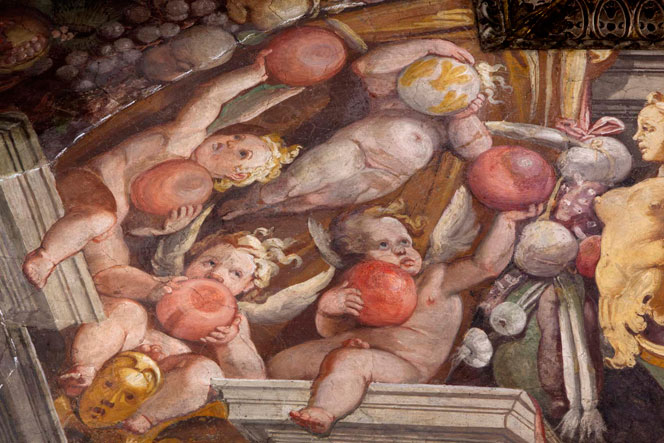
Palazzo Firenze, Sala delle Stagioni (Room of the Seasons), detail of the frescoes by Jacopo Zucchi
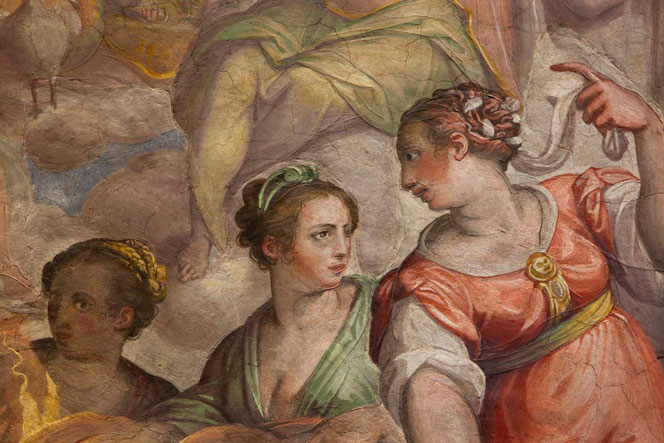
Palazzo Firenze, Sala degli Elementi (Room of the Elements), detail of the frescoes by Jacopo Zucchi
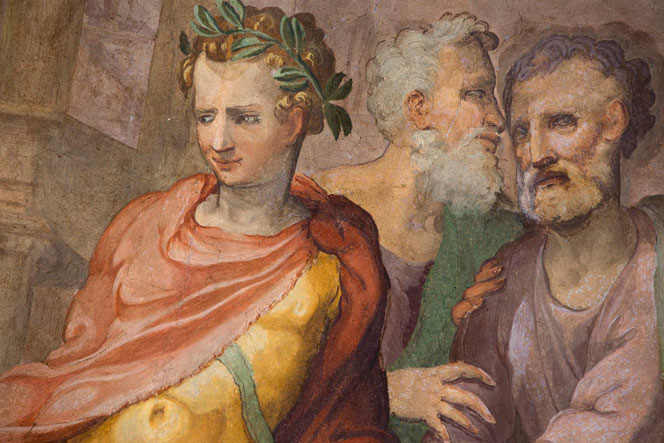
Palazzo Firenze, Lodge on the ground floor, detail of the frescoes by Prospero Fontana
Over 125 years have passed since the Dantes's foundation. What is the state of its Committees in the world?
A strange phenomenon is occurring: there is a tangible crisis going on, with fewer and fewer resources to count on, and yet new Committees keep opening. New-generation Committees, offering language courses of certified quality, based on the most innovative material. We call them "Certification centers". Unfortunately, some of the old-style Committees have not been able to renew themselves, and still depend on Italian-themed evenings with spaghetti, pizza, and old movies. But I am hopeful... Our language and our culture still interest hundreds of thousands of people in the world, and as I mentioned we are opening new Committees in countries that are just starting to discover Italy, especially in the Eastern world. We try to fill the unforgivable void left by the Institutes of Culture closed by the Ministry of Foreign Affairs.
Who would you like to have here to discuss all of the most urgent needs of the Dante?
Right now, I would like to have Dante himself beside me. Borges, who once stated that the "Divine Comedy" is "the best book ever written by man", said that we should read it "with childlike faith, with abandon, and then it will be with us for the rest of our lives". The great Albanian writer Ismail Kadare wrote, "no other literary creation puts the human conscience closer to its epicenter". Dante tells the story of all of humanity. All of us are Ulysses, because we all want to go beyond the limits of our knowledge; all of us are Count Ugolino, cannibalizing ourselves; all of us are Paolo and Francesca, victims of passion... By saying I wish Dante were here, I mean that I wish for the highest authority to remind us that we have something the world needs. This is the reason why we have made a movie inspired by the "Divine Comedy" called "Maratona infernale" ("Marathon in hell"), which tells the story of modern Italy through a combination of images and the words of Dante's poem. Dante is the poet of Italy and of modern times, and he has made our country truly eternal in the world's eyes. England gave us Shakespeare, Germany gave us Goethe, and Russia gave us Tolstoy and Dostoevsky... Italy has had many great poets and writers who have explored the human soul, but Dante was the only one to really express the universal feeling of 'pietas' that all men share, in any time and in any place.
Photos via © Renato Cerisola
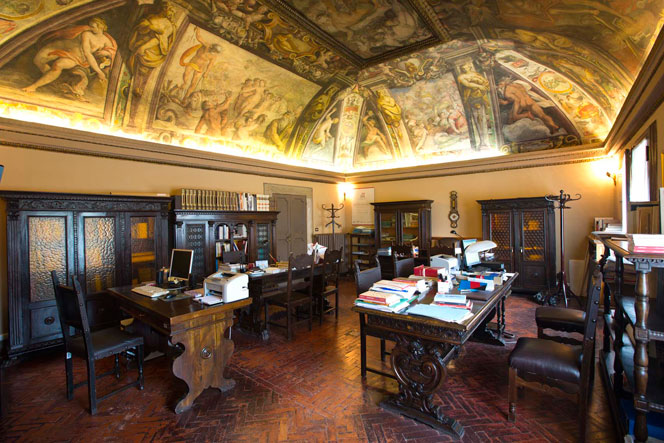
Palazzo Firenze, Saletta degli Elementi (Room of the Elements)
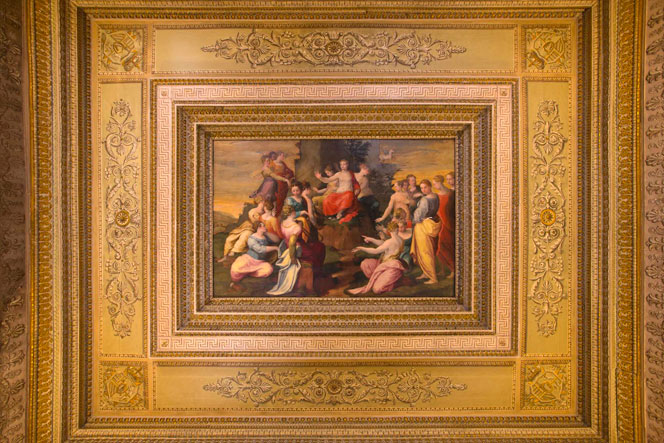
Prospero Fontana, "Dispute between the Muses and the Pierides"
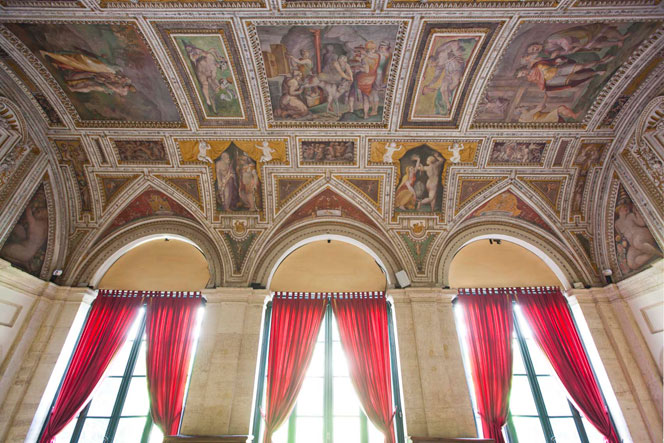
Palazzo Firenze, Lodge on the ground floor, view of the frescoes by Prospero Fontana
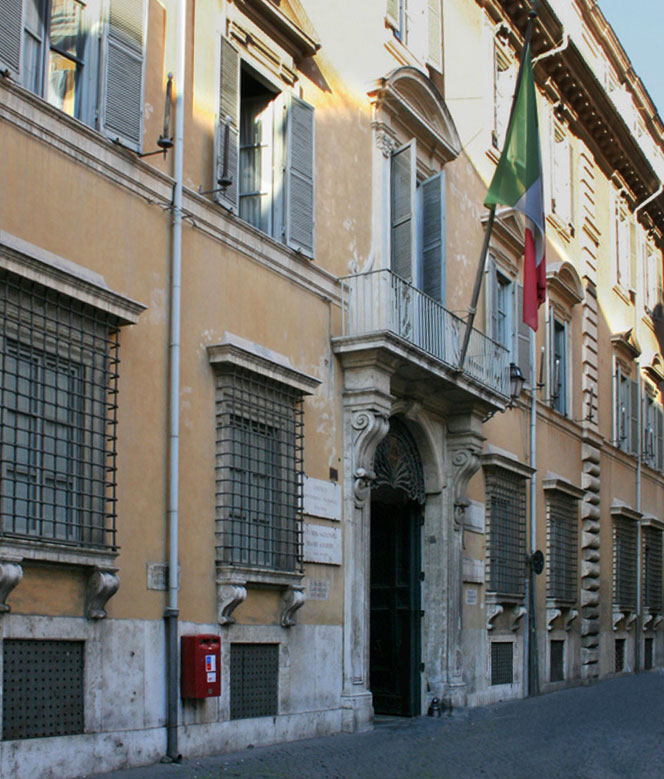
Palazzo Firenze, facade on Piazza Firenze
